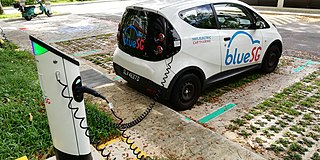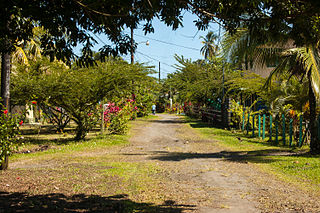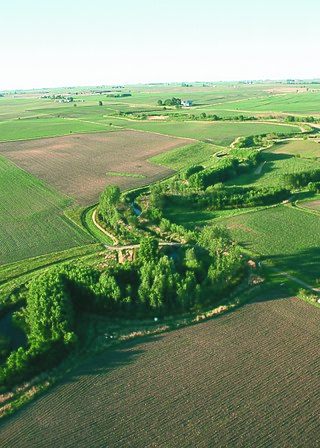Related Research Articles
Environmental finance is a field within finance that employs market-based environmental policy instruments to improve the ecological impact of investment strategies. The primary objective of environmental finance is to regress the negative impacts of climate change through pricing and trading schemes. The field of environmental finance was established in response to the poor management of economic crises by government bodies globally. Environmental finance aims to reallocate a businesses resources to improve the sustainability of investments whilst also retaining profit margins.

The International Union for Conservation of Nature (IUCN) is an international organization working in the field of nature conservation and sustainable use of natural resources. Founded in 1948, IUCN has become the global authority on the status of the natural world and the measures needed to safeguard it. It is involved in data gathering and analysis, research, field projects, advocacy, and education. IUCN's mission is to "influence, encourage and assist societies throughout the world to conserve nature and to ensure that any use of natural resources is equitable and ecologically sustainable".

The Global Environment Facility (GEF) is a multilateral environmental fund that provides grants and blended finance for projects related to biodiversity, climate change, international waters, land degradation, persistent organic pollutants (POPs), mercury, sustainable forest management, food security, and sustainable cities in developing countries and countries with economies in transition. It is the largest source of multilateral funding for biodiversity globally and distributes more than $1 billion a year on average to address inter-related environmental challenges.
A green economy is an economy that aims at reducing environmental risks and ecological scarcities, and that aims for sustainable development without degrading the environment. It is closely related with ecological economics, but has a more politically applied focus. The 2011 UNEP Green Economy Report argues "that to be green, an economy must not only be efficient, but also fair. Fairness implies recognizing global and country level equity dimensions, particularly in assuring a Just Transition to an economy that is low-carbon, resource efficient, and socially inclusive."

The Center for International Forestry Research (CIFOR) is a non-profit scientific research organization that conducts research on the use and management of forests with a focus on tropical forests in developing countries. CIFOR, which merged with World Agroforestry on Jan. 1, 2019, is the forestry and agroforestry research center of CGIAR, a network of 15 research centers around the world that focus on agricultural research for sustainable development, working closely with governments and other partners to help develop evidence-based solutions to problems related to sustainable agriculture and natural resource management.

Human impact on the environment refers to changes to biophysical environments and to ecosystems, biodiversity, and natural resources caused directly or indirectly by humans. Modifying the environment to fit the needs of society is causing severe effects including global warming, environmental degradation, mass extinction and biodiversity loss, ecological crisis, and ecological collapse. Some human activities that cause damage to the environment on a global scale include population growth, neoliberal economic policies and rapid economic growth, overconsumption, overexploitation, pollution, and deforestation. Some of the problems, including global warming and biodiversity loss, have been proposed as representing catastrophic risks to the survival of the human species.

Clean technology, also called cleantech or climatetech, is any process, product, or service that reduces negative environmental impacts through significant energy efficiency improvements, the sustainable use of resources, or environmental protection activities. Clean technology includes a broad range of technology related to recycling, renewable energy, information technology, green transportation, electric motors, green chemistry, lighting, grey water, and more. Environmental finance is a method by which new clean technology projects can obtain financing through the generation of carbon credits. A project that is developed with concern for climate change mitigation is also known as a carbon project.

C40 Cities Climate Leadership Group is a group of 96 cities around the world that represents one twelfth of the world's population and one quarter of the global economy. Created and led by cities, C40 is focused on fighting the climate crisis and driving urban action that reduces greenhouse gas emissions and climate risks, while increasing the health, wellbeing and economic opportunities of urban residents.
The World Cities Summit is an international conference series on public governance and the sustainable development of cities.

Environmental issues are disruptions in the usual function of ecosystems. Further, these issues can be caused by humans or they can be natural. These issues are considered serious when the ecosystem cannot recover in the present situation, and catastrophic if the ecosystem is projected to certainly collapse.

Green growth is a concept in economic theory and policymaking used to describe paths of economic growth that are environmentally sustainable. It is based on the understanding that as long as economic growth remains a predominant goal, a decoupling of economic growth from resource use and adverse environmental impacts is required. As such, green growth is closely related to the concepts of green economy and low-carbon or sustainable development. A main driver for green growth is the transition towards sustainable energy systems. Advocates of green growth policies argue that well-implemented green policies can create opportunities for employment in sectors such as renewable energy, green agriculture, or sustainable forestry.

The International Day of Forests was established on the 21st day of March, by resolution of the United Nations General Assembly on November 28, 2013. Each year, various events celebrate and raise awareness of the importance of all types of forests, and trees outside forests, for the benefit of current and future generations. Countries are encouraged to undertake efforts to organize local, national, and international activities involving forests and trees, such as tree planting campaigns, on International Day of Forests. The Secretariat of the United Nations Forum on Forests, in collaboration with the Food and Agriculture Organization, facilitates the implementation of such events in collaboration with governments, the Collaborative Partnership on Forests, and international, regional and subregional organizations. International Day of Forests was observed for the first time on March 21, 2013.

Green urbanism has been defined as the practice of creating communities beneficial to humans and the environment. According to Timothy Beatley, it is an attempt to shape more sustainable places, communities and lifestyles, and consume less of the world's resources. Urban areas are able to lay the groundwork of how environmentally integrated and sustainable city planning can both provide and improve environmental benefits on the local, national, and international levels. Green urbanism is interdisciplinary, combining the collaboration of landscape architects, engineers, urban planners, ecologists, transport planners, physicists, psychologists, sociologists, economists and other specialists in addition to architects and urban designers.

The International Resource Panel is a scientific panel of experts that aims to help nations use natural resources sustainably without compromising economic growth and human needs. It provides independent scientific assessments and expert advice on a variety of areas, including:

Climate finance is an umbrella term for financial resources such as loans, grants, or domestic budget allocations for climate change mitigation, adaptation or resiliency. Finance can come from private and public sources. It can be channeled by various intermediaries such as multilateral development banks or other development agencies. Those agencies are particularly important for the transfer of public resources from developed to developing countries in light of UN Climate Convention obligations that developed countries have.

The United Nations Climate Change Conference, COP19 or CMP9 was held in Warsaw, Poland from 11 to 23 November 2013. This is the 19th yearly session of the Conference of the Parties to the 1992 United Nations Framework Convention on Climate Change (UNFCCC) and the 9th session of the Meeting of the Parties to the 1997 Kyoto Protocol. The conference delegates continue the negotiations towards a global climate agreement. UNFCCC's Executive Secretary Christiana Figueres and Poland's Minister of the Environment Marcin Korolec led the negotiations.

The 2016 United Nations Climate Change Conference was an international meeting of political leaders and activists to discuss environmental issues. It was held in Marrakech, Morocco, on 7–18 November 2016. The conference incorporated the twenty-second Conference of the Parties (COP22), the twelfth meeting of the parties to the Kyoto Protocol (CMP12), and the first meeting of the parties to the Paris Agreement (CMA1). The purpose of the conference was to discuss and implement plans about combatting climate change and to "[demonstrate] to the world that the implementation of the Paris Agreement is underway". Participants work together to come up with global solutions to climate change.

Nature-based solutions describe the development and use of nature (biodiversity) and natural processes to address diverse socio-environmental issues. These issues include climate change mitigation and adaptation, human security issues such as water security and food security, and disaster risk reduction. The aim is that resilient ecosystems provide solutions for the benefit of both societies and biodiversity. The 2019 UN Climate Action Summit highlighted nature-based solutions as an effective method to combat climate change. For example, nature-based systems for climate change adaptation can include natural flood management, restoring natural coastal defences, and providing local cooling.

Due to its geographical and natural diversity, Indonesia is one of the countries most susceptible to the impacts of climate change. This is supported by the fact that Jakarta has been listed as the world's most vulnerable city, regarding climate change. It is also a major contributor as of the countries that has contributed most to greenhouse gas emissions due to its high rate of deforestation and reliance on coal power.
Francisco Benedito Valentín is a Spanish businessman, entrepreneur and public speaker based in Valencia, Spain. He is the founder and current CEO of ClimateTrade, a blockchain-based marketplace for carbon offsetting and the chairman at ClimateCoin, the world's first regulated crypto carbon asset.
References
- ↑ "United Nations Conference on Environment and Development, Rio de Janeiro, Brazil, 3-14 June 1992".
- ↑ "B4E: Caring for the Environment Can be Good for Business". Knowledge@SMU. Knowledge@SMU. Retrieved 20 July 2011.
- ↑ "Green Business: A Key to Protecting Climate" (PDF). UNEP. UNEP. Retrieved 22 June 2011.
- ↑ Kwon, Mee-yoo (15 April 2010). "Business Leaders to Gather in Seoul for B4E Summit". The Korea Times. Archived from the original on 4 October 2012. Retrieved 20 June 2011.
- ↑ Tobias, Chris. "B4E Summit: Energy critical to get right". Eco-Business.com. Archived from the original on 19 April 2011. Retrieved 22 June 2010.
- ↑ "B4E Climate Summit 2010 Statement (UN Global Compact)" (PDF). UN Global Compact. UN Global Compact. Retrieved 24 June 2011.
- ↑ Malkin, Elizabeth (6 October 2010). "Businesses Seek Clarity on Climate Goals". NYTimes.com. Archived from the original on 13 July 2011. Retrieved 21 June 2011.
- ↑ "B4E Panel Discusses Solutions for a Low Carbon Future". Environmental Leader. Retrieved 22 June 2011.
- ↑ Satriastanti, Fidelis E. (29 April 2011). "B4E Summit: Adviser Explains What SBY Meant by 'Balls'". Jakarta Globe. Archived from the original on 26 September 2012. Retrieved 21 June 2011.
- ↑ "UNDP Administrator Addresses B4E Summit". Climate Change Policy & Practice. Retrieved 22 June 2011.
- ↑ Christie, Shirley (30 April 2011). "Students Get Primer on Conservation". Jakarta Globe. Archived from the original on 27 September 2012. Retrieved 21 July 2011.